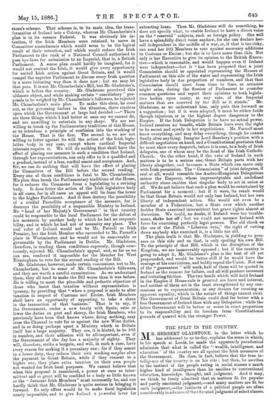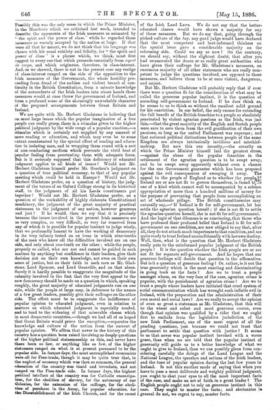THE SPLIT IN THE COUNTRY.
MR. HERBERT GLADSTONE, in the letter which he has addressed to us to-day, explains the sense in which, in his speech at Leeds, he made the apparently paradoxical admission that what is called the '• wealth, intelligence, and education " of the country are all against the Irish measures of the Government. He does, in fact, believe that the true in- telligence of the country is on his side ; but then, he ascribes to the instinct of the people voting in social masses a much higher kind of intelligence than he ascribes to conventional education, knowledge, thought, and judgment. And it may, we think, be freely admitted that on matters fit for popular and partly emotional judgment,—and many matters are fit for such judgment,—the instincts of a political people are often considerably in advance of the educated judgment of select classes.
Possibly this was the only sense in which the Prime Minister, inthe Manifesto which we criticised last week, intended to describe the opponents of the Irish measures as animated by
the spirit and the power of class," while he regarded those measures as warmly accepted by the nation at large. If that were all that he meant, we do not think that his language was chosen with his usual subtlety and felicity, for " the spirit and power of class " is a phrase which, we think, must first suggest to every one that which proceeds essentially from esprit de corps, and which originates, therefore, in class-interest. And, as we showed, there is not in the present case any vestige of class-interest ranged on the side of the opposition to the Irish measures of the Government, the whole hostility pro- ceeding from dread of the sudden and violent breach of con- tinuity in the British Constitution, from a minute knowledge of the antecedents of the Irish leaders into whose hands those measures would at once throw the government of Ireland, and from a profound sense of the alarmingly unworkable character of the proposed arrangements between Great Britain and Ireland.
We are quite with Mr. Herbert Gladstone in believing that oa-most large issues which the popular imagination of a free people can really grasp,there ia_a stimulus given to the higher political judgment by the wide range of a popular emotion,—a stimulus which is certainly not supplied by any amount of mere reading or education, and which may even be to some extent counteracted by the special effect of reading and educa- tion in isolating men, and in wrapping them round with a sort of non-conducting medium which prevents the vivid beat of popular feeling _from penetrating them with adeqoate force. But is it seriously supposed that this deficiency of educated judgment applies to all kinds of issues ? Would not Mr. Ilerbert Gladstone himself prefer Mr. Goschen's judgment on a-question of true political economy, to that of any popular meeting which could be held in Europe Would not Mr. Herbert Gladstone prefer, on a question of history, the judg- ment of the tutors of an Oxford College strong in its historical staff, to the judgment of all his Leeds constituents put together ? Would not Mr. Herbert Gladstone prefer, on a question of the workability of highly elaborate Constitutional machinery, the judgment of the great majority of practical statesmen to the judgment of any nation, however generous and just ? If he would, then we say that it is precisely because the issues involved in the present Irish measures are so very complex, so very difficult, so very far removed from any of which it is possible for popular instinct to judge wisely, that we profoundly lament to have the working of democracy in- its very infancy tested on an issue in which nine-tenths of- the men who.know all the difficulties involved are on one aide, and only about one-tenth on the other ; while the people, properly so called, who are not and cannot be guided in such matters by anything but confidence in their leaders, give their decision not on their own knowledge, not even on their own sense of justice, but on their faith in such men as Mr. Glad- stone, Lord Spencer, and Lord Granville, and on that alone. Surely it is hardly possible to exaggerate the magnitude of the calamity involved in the fact that the very first appeal to the new democracy should be made on a question in which, speaking roughly, the great majority of educated judgments run on one side, while the people at large may, in deference to the names of a few great leaders, possibly give their suffrages on the other side. The effect must be to exaggerate the indifference of popular opinion to educated judgment, even in relation to matters on which educated judgment is especially needed, and to tend to the widening of that miserable chasm which in most democratic countries,—though we had all of us hoped that Great Britain would prove the exception,—separates the knowledge and culture of the nation from the current of popular opinion. We affirm that-never in the-history of this country has a question been raised involving:ao deeply questions of the higher political statesmanship as this, and never have there been so,- few, or anything like so few, of the higher statesmen ranged as what is at -present presumed to be the popular gide. In- former-days,the most accomplished economists were-all for Fees-trade, though it may be quite true that, in the segleot -of economy which_ was then so aorninoni,the general education of the country was- timid and irresolute, and not -ranged- on the Pxee.trade. side- In former days, the highest political -intellect of the country was for Catholic emancipa- tion, for the abolition of slavery, for the autonomy of our 001w:ties, for the extension- of the suffrage, for the aboli- aka of riche.% in- the. Army, for popular education, for abo-Dieestablishment of the Irish Church, and for the recast
of the Irish Land Laws. We do not say that the better- educated classes would have shown a majority for any of these measures. But we do say that, going through the picked culture of the day, any good. judge would have declared that the most competent and best-informed thinkers on the special issue gave a considerable majority on the reforming side. Could we say so now ? On the contrary, we should say, without the slightest doubt, that after you had enumerated the dozen or so really great authorities who have given their suffrage for Mr. Gladstone's measures, an enormous majority of all other statesmen who are really com- petent to judge the questions involved, are opposed to those measures, and believe them to be at once violent, dangerous, and unjust.
But Mr. Herbert Gladstone will probably reply that if ever there were a question fit for the consideration of what may be called the generous popular instinct, it is the question of according self-government to Ireland. If he does think so, he seems to us to think so without the smallest solid ground for his conviction. In our belief, the only excuse for extending the full benefit of the British franchise to a people so absolutely penetrated by violent agrarian passions as the Irish, was just this,—that the great majority of the English and Scotch people were sure to save them from the evil gratification of their own passions, so long as the united Parliament was supreme ; and that enforced political distinctions between people of the same Kingdom are always intrinsically invidious and mischief- making. But now this one security,—the security on which the Prime Minister himself laid the greatest stress, —against the abuse of the popular franchise in the settlement of the agrarian question is to be swept away, and to be swept away apparently without even a chance for the one Government guarantee which has been proposed against the evil consequences of sweeping it away. The appeal to the people of England as to whether the peoplg Ireland are or are not fit to govern themselves, is found toi...)e one of a kind which cannot well be accompanied by a solemn appropriation of more than a hundred millions of money for the purpose of preventing that people from accomplishing an act of wholesale pillage. The British constituencies may naturally say,—' If Ireland is fit for self-government, let her settle the agrarian question herself ; if she is not fit to settle the agrarian question herself, she is not fit for self-government.' And the logic of that dilemma is so convincing, that those who have professed their profound belief that Ireland is fit for self- government on one condition, are now obliged to say that, after all, they do not attach much importance to that condition, and are quite ready to trust Ireland unconditionally with herown destiny. Well, then, what is the question that Mr. Herbert Gladstone really puts to the uninformed popular judgment of the British people ? It is the question whether the Irish people are or are not fit for separate self-government. And he hopes that our generous feelings will decide that question in the affirmative. But is it a question of generous feeling ? Or, rather, is it not the true generosity which is the most exacting and discriminating in going back on the facts ? Are we to trust a people amongst whom, on the very face of the case, agrarian crime is popular, with the punishment of agrarian crime ? Are we to trust a people whose leaders have initiated that cruel system of social excommunication which has wrought such infinite evil in Ireland, with the preparation and the administration of their own moral and social laws ? Are we really to accept the opinion of even so great a statesman as Mr. Gladstone, that this will be the wisest and safest and most generous course, even though that opinion was qualified by a rider that we ought first to exclude from the legislative jurisdiction of the new Irish Parliament, one of the most urgent of all the pending questions, just because we could not trust that parliament to settle that question with justice ? It seems to us that never was popular instinct invoked with a worse grace, than when we are told that the popular instinct of generosity will guide us to a better knowledge of what we ought to give to Ireland, than we can possibly glean from con- sidering, carefully the doings of the Land League and the National League, the speeches and actions of the Irish leaders, and the tone of popular opinion during the last few years in Ireland. Is not this another mode of saying that when you have to pass a most deliberate and weighty political judgment, you ought to shut your eyes to all the most important facts of the case, and make an act of faith in. a great leader V The English people ought nut to rely on generous instinct is this case. They ought to master the facts.; and electorates in general do. not,, we regret to say, master facts.



































 Previous page
Previous page